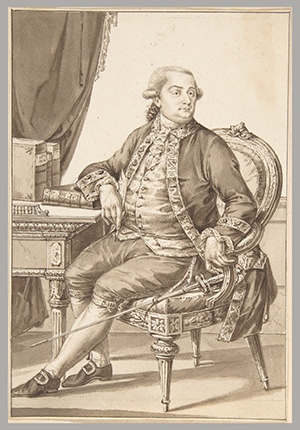Historic Document
On Crimes and Punishments (1764)
Cesare Bonesana di Beccaria | 1764

The Metropolitan Museum of Art, New York, The Elisha Whittelsey Collection, The Elisha Whittelsey Fund, 1949
Summary
Cesare Bonesana di Beccaria, marquis of Gualdasco and Villaregio (1738-94), was the author of On Crimes and Punishments (1764). Inspired by the discussion of criminal law in Montesquieu’s Spirit of the Laws, this Milanese wrote a systematic treatise on the subject that was almost immediately translated into English and French. In it, he argued that the sole purpose of punishment is deterrence, and he denounced torture, the entertainment of secret accusations, and the death penalty; suggested that pre-trial detention can rarely be justified; and called for promptitude in punishment. The impact of his little book on the post-revolutionary revisal of the laws in the various nascent American states was considerable.
Selected by

Paul Rahe
Professor of History and Charles O. Lee and Louise K. Lee Chair in the Western Heritage at Hillsdale College

Jeffrey Rosen
President and CEO, National Constitution Center

Colleen A. Sheehan
Professor of Politics at the Arizona State University School of Civic and Economic Thought and Leadership
Document Excerpt
Chapter 1: Of the Origin of Punishment
Laws are the conditions under which men, naturally independent, united themselves in society. Weary of living in a continual state of war, and of enjoying a liberty which became of little value, from the uncertainty of its duration, they sacrificed one part of it to enjoy the rest in peace and security. . . .
Chapter 2: Of the Right to Punish
Every punishment which does not arise from absolute necessity, says the great Montesquieu, is tyrannical. A proposition which may be made more general, thus. Every act of authority of one man over another, for which there is not an absolute necessity, is tyrannical. It is upon this, then, that the sovereign’s right to punish crimes is founded; that is, upon the necessity of defending the public liberty, intrusted to his care, from the usurpation of individuals. . . .
No man ever gave up his liberty merely for the good of the public. Such a chimera exists only in romances. Every individual wishes, if possible, to be exempt from the compacts that bind the rest of mankind. . . .
Observe, that by justice I understand nothing more than that bond, which is necessary to keep the interest of individuals united; without which, men would return to the original state of barbarity. All punishments, which exceed the necessity of preserving this bond, are in their nature unjust.
Chapter 6: Of the Proportion between Crimes and Punishments
It is not only the common interest of mankind that crimes should not be committed, but that crimes of every kind should be less frequent, in proportion to the evil they produce to society. Therefore, the means made use of by the legislature to prevent crimes, should be more powerful, in proportion as they are destructive of the public safety and happiness, and as the inducements to commit them are stronger. Therefore there ought to be a fixed proportion between crimes and punishments.
Chapter 12: Of the Intent of Punishments
From the foregoing considerations it is evident, that the intent of punishments is not to torment a sensible being, nor to undo a crime already committed. Is it possible that torments, and useless cruelty, the instruments of furious fanaticism, or of impotency of tyrants, can be authorized by a political body? which, so far from being influenced by passion, should be the cool moderator of the passions of individuals. Can the groans of a tortured wretch recal the time past, or reverse the crime he has committed? The end of punishment, therefore, is no other, than to prevent others from committing the like offence. Such punishments, therefore, and such a mode of inflicting them, ought to be chosen, as will make strongest and most lasting impressions on the minds of others, with the least torment to the body of the criminal.




